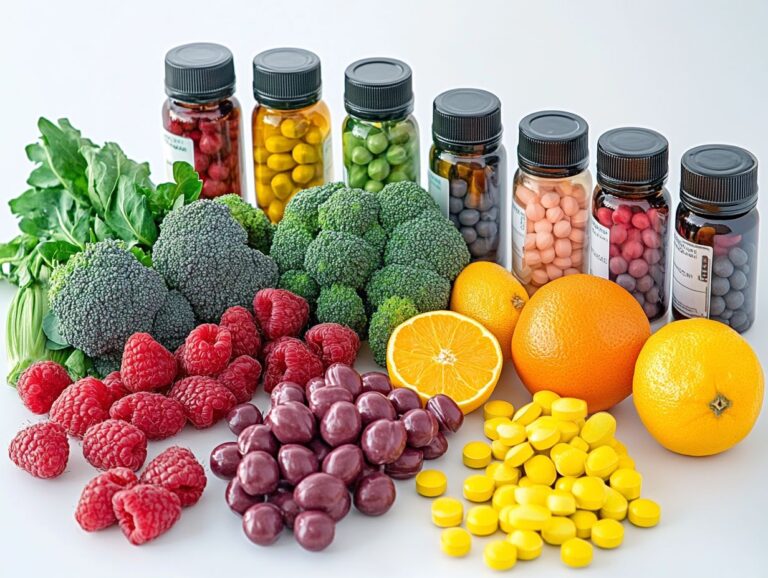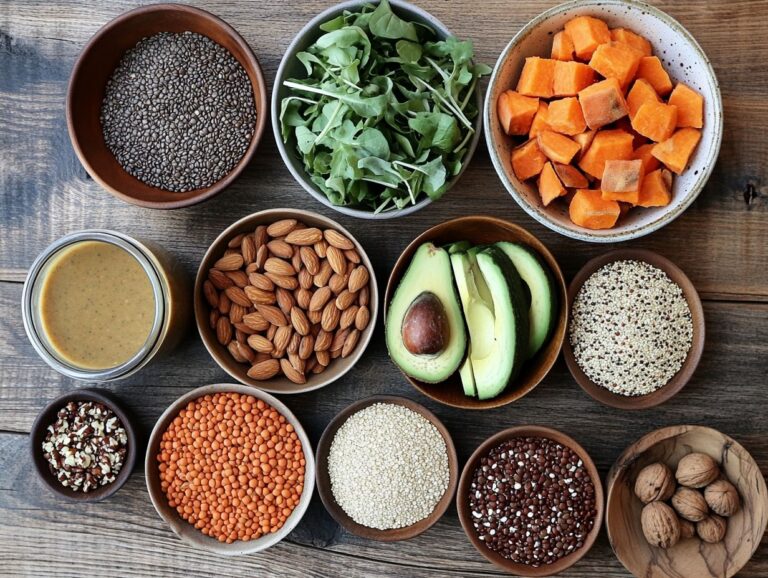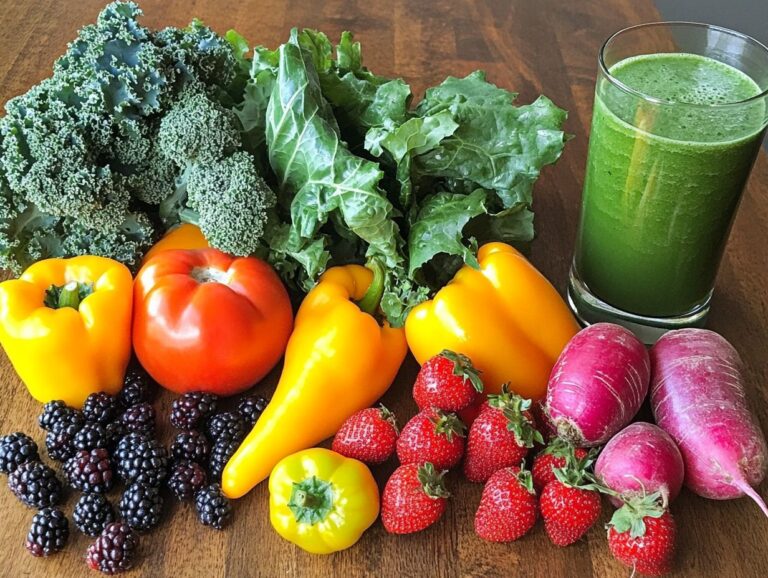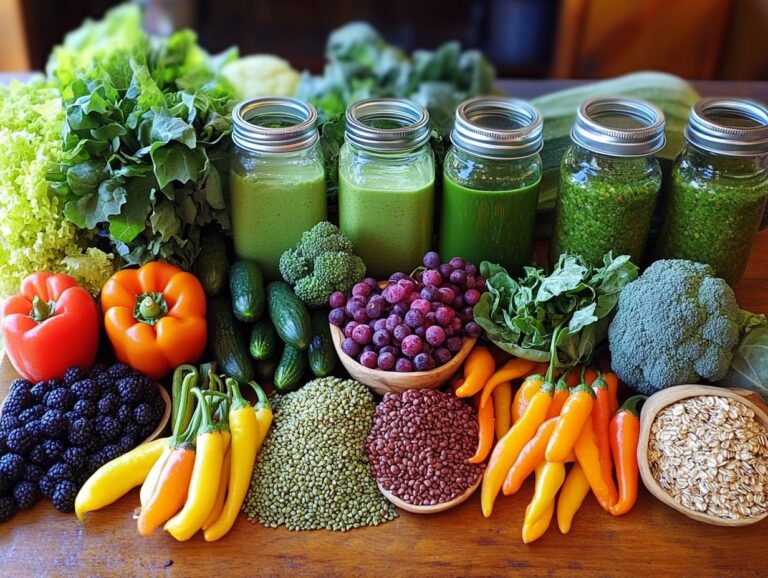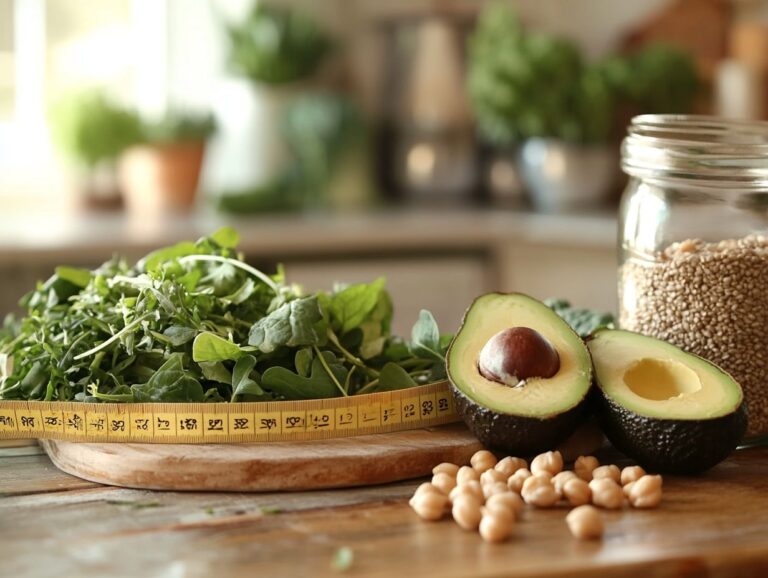The raw vegan diet is a lifestyle that consists solely of uncooked plant-based foods. This diet offers numerous benefits for health, the environment, and animal welfare. In this article, we will explore the fundamental principles of a raw vegan diet, the types of foods included, and provide tips for transitioning to this way of eating, whether for a short time or as a permanent change. Additionally, we will offer guidance on how to maintain a healthy and balanced approach to this vibrant and nourishing diet.
Key Takeaways:
- A raw vegan diet can have numerous health benefits, such as improved digestion and increased energy levels.
- Transitioning to a raw vegan diet should be done gradually and with proper research and education in order to ensure success.
- Maintaining a healthy raw vegan lifestyle involves listening to your body, staying hydrated, and incorporating a variety of fruits and vegetables into your meals.
What Is a Raw Vegan Diet?
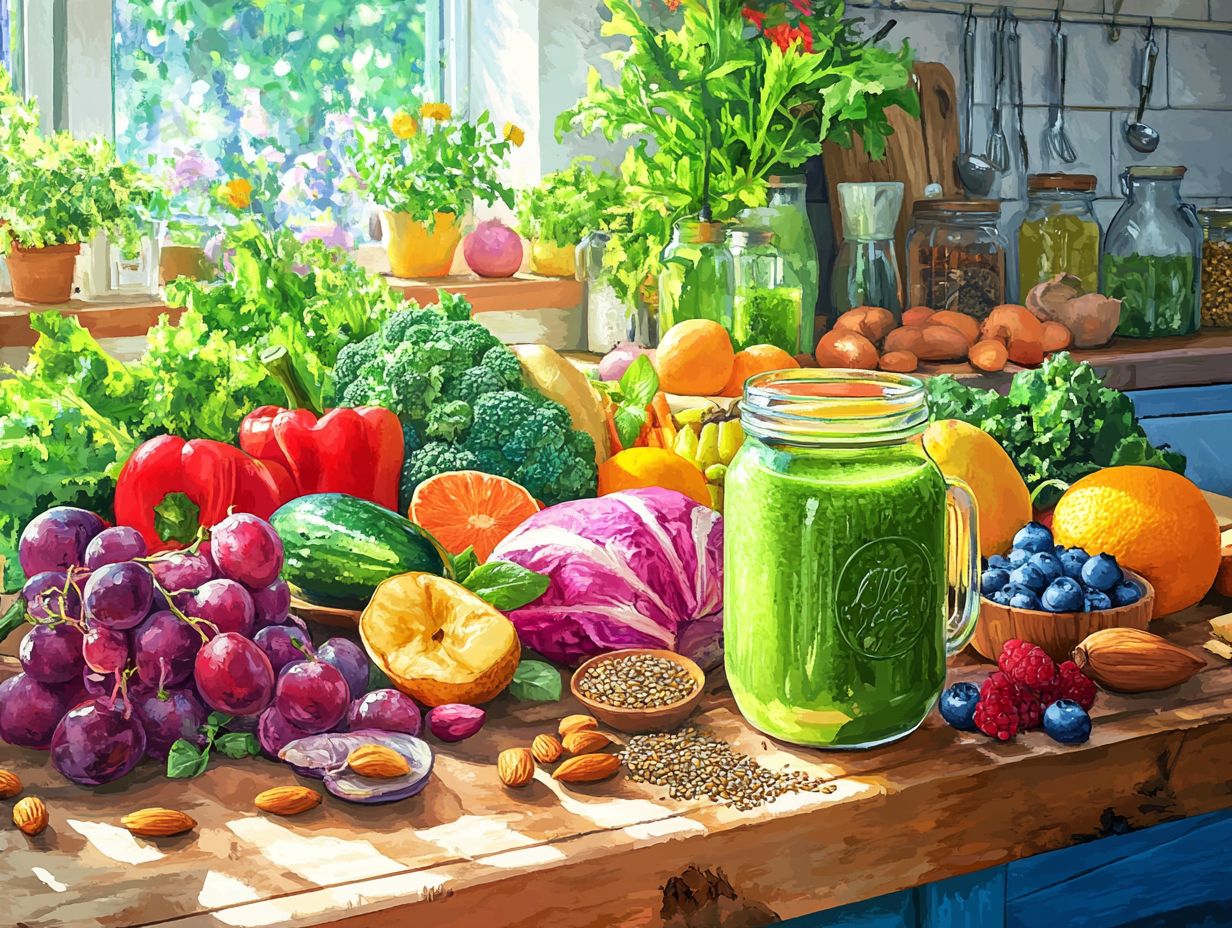 A raw vegan diet is a lifestyle choice that involves consuming a plant-based diet composed of uncooked, unprocessed foods. This nutrient-rich lifestyle emphasizes nutrient-dense fruits, vegetables, nuts, seeds, and sprouted grains, contributing to vibrant living and a vibrant palette of culinary options. By focusing on fresh, whole foods that retain their natural enzymes and health benefits, this plant-based way of living offers a diverse array of raw food options that promote vibrant health and culinary creativity.
A raw vegan diet is a lifestyle choice that involves consuming a plant-based diet composed of uncooked, unprocessed foods. This nutrient-rich lifestyle emphasizes nutrient-dense fruits, vegetables, nuts, seeds, and sprouted grains, contributing to vibrant living and a vibrant palette of culinary options. By focusing on fresh, whole foods that retain their natural enzymes and health benefits, this plant-based way of living offers a diverse array of raw food options that promote vibrant health and culinary creativity.
Why Choose a Raw Vegan Diet?
A raw vegan diet can enhance your health by increasing energy levels, improving nutrient absorption, and fostering a healthy digestive environment. This diet promotes a more vibrant lifestyle through a colorful variety of fresh fruits, crunchy veggies, and healthy fats, acting as an energy booster and leading to glowing skin and overall vitality. Additionally, adopting a raw vegan diet initiates a powerful detoxification process that rejuvenates both the mind and body, allowing for aging gracefully and enhancing the overall wellness journey.
1. Health Benefits
A raw vegan lifestyle offers numerous health benefits, including increased nutrient absorption, improved overall health, graceful aging, and a reduced risk of chronic diseases. A high-fiber, nutrient-rich diet consisting of fresh fruits, vegetables, nuts, and seeds promotes digestive health and contributes to overall wellness. This lifestyle switch-up aids in healthy weight control, as meals are typically low in calories but high in essential nutrients, ensuring nutritional bliss. Better heart health can also be achieved, as the antioxidants and natural sweetness found in these foods help lower cholesterol levels and maintain normal blood pressure. Individuals following this lifestyle often report higher energy levels, feeling more rejuvenated and alert throughout the day. Additionally, consuming a wide variety of colorful foods provides a broader spectrum of vitamins and minerals, enhancing the benefits of this lifestyle and fostering a deeper connection with food and health in general.
2. Environmental Benefits
The environmental benefits of raw veganism stem from its emphasis on sustainable living and the reduction of an individual’s carbon footprint. Those who adopt a raw vegan diet prioritize plant-based foods, thereby decreasing their reliance on animal products. This shift contributes to a more sustainable food system with lower resource consumption and less environmental degradation. Additionally, a raw vegan diet encourages the consumption of seasonal and local produce, resulting in less waste due to minimal packaging and processing of raw ingredients. Raw veganism aligns well with eco-friendly practices such as organic farming and regenerative agriculture, which enhance soil health and biodiversity. If enough individuals make the conscious decision to embrace raw vegan diets, it can significantly reduce greenhouse gas emissions from livestock farming, thereby supporting a healthier planet. Embracing the raw vegan lifestyle can foster a positive feedback loop of health and environmental benefits, where advancements in one area reinforce improvements in the other, ultimately leading to increased community change and a global impact of the raw vegan diet.
3. Ethical Considerations
Ethical considerations play a significant role in the raw vegan lifestyle, which promotes animal welfare and a compassionate approach by eliminating the use of animal products. By adopting a plant-based diet, individuals can align their eating habits with their moral values and support a more humane way of consuming food. This philosophy extends beyond simply avoiding meat and dairy; it encompasses a holistic perspective on food production, highlighting concerns about the humane treatment of livestock and the environmental impacts of traditional farming practices. A raw vegan diet encourages participants to reevaluate the sources of their food and to prioritize ethical sourcing and sustainable farming in their choices. As they delve into the philosophical foundations of veganism, many advocates find that embracing a raw vegan lifestyle not only fosters a deeper sense of responsibility for animal rights but also contributes to their own improved health, vibrant health, and that of the environment.
How to Start a Raw Vegan Diet?
Transitioning to a raw vegan diet requires careful planning and commitment. However, with the right transition tips for making the switch, anyone can successfully adopt this healthy lifestyle and enjoy the lifestyle benefits. Start by researching the key components of a raw vegan lifestyle, which includes understanding meal planning and identifying essential kitchen tools for food preparation. It’s important to maintain a consistent supply of fresh fruits, vegetables, and protein sources such as nuts and seeds. This focus on nutrient-dense foods will facilitate a smoother transition and contribute to overall wellness.
1. Research and Educate Yourself
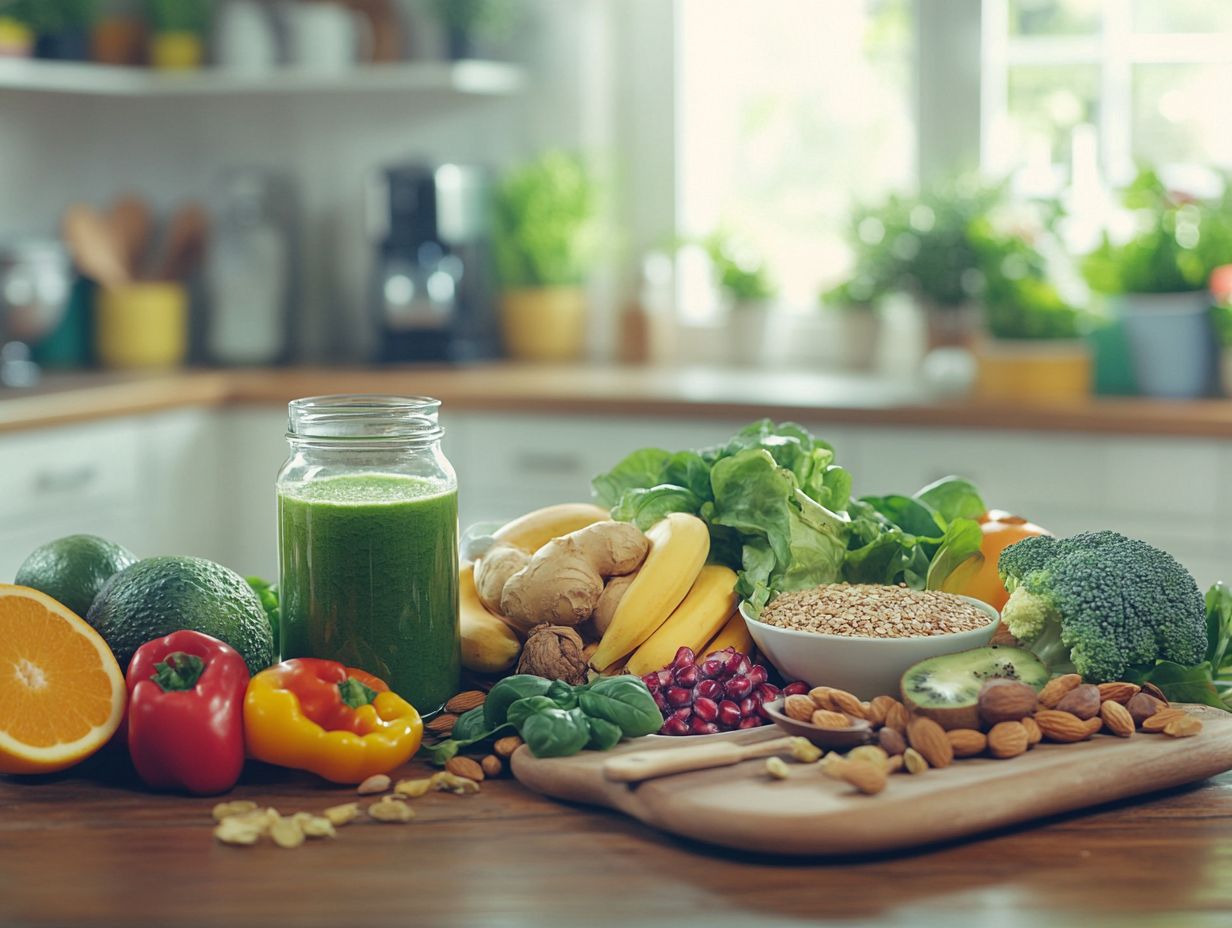 Before transitioning to a raw vegan diet, it is essential to seek help, conduct research, and learn about the health benefits, food options, and potential challenges associated with this lifestyle. Understanding raw foods, which consist of nutrient-rich fruits and vegetables, enables you to make informed decisions as you embark on your health journey and recovery. This knowledge not only supports your personal health but also introduces you to a variety of resources that offer insights into the raw vegan lifestyle. Books, documentaries, and online communities are excellent starting points for those interested in exploring the numerous benefits of incorporating raw food into their daily diet. The advantages range from improved digestion to increased energy levels, as utilizing uncooked, unprocessed ingredients significantly impacts overall health. It is also important to recognize that certain raw foods, such as nuts and seeds, provide the healthy fats and proteins necessary to transform this passion into a sustainable lifestyle.
Before transitioning to a raw vegan diet, it is essential to seek help, conduct research, and learn about the health benefits, food options, and potential challenges associated with this lifestyle. Understanding raw foods, which consist of nutrient-rich fruits and vegetables, enables you to make informed decisions as you embark on your health journey and recovery. This knowledge not only supports your personal health but also introduces you to a variety of resources that offer insights into the raw vegan lifestyle. Books, documentaries, and online communities are excellent starting points for those interested in exploring the numerous benefits of incorporating raw food into their daily diet. The advantages range from improved digestion to increased energy levels, as utilizing uncooked, unprocessed ingredients significantly impacts overall health. It is also important to recognize that certain raw foods, such as nuts and seeds, provide the healthy fats and proteins necessary to transform this passion into a sustainable lifestyle.
2. Gradually Transition from Your Current Diet
Transitioning to a raw vegan diet can be accomplished gradually. This gradual approach allows your digestive system to adjust to the change and fully benefit from the nutrients that raw foods provide. Begin by incorporating raw fruits and vegetables into your meals while slowly reducing the amount of processed and cooked foods. This strategy will help you ease into the diet and minimize any digestive discomfort that may arise from sudden dietary changes. Focus on meal planning by including one completely raw meal each day, allowing your palate to adapt over time. In terms of cooking and preparing raw food, consider making larger batches of dishes such as:
- Salads
- Smoothies
- Energy bars
to simplify your weekly meal preparation. Eating seasonal produce will not only enhance flavor and nutritional value but also make it easier to stick to a raw food diet. Feel free to experiment with different textures and flavors to keep your meals exciting, while paying attention to how your body responds. As you gradually incorporate more fresh produce into your meals and reduce cooked foods, you will become more aware of the health benefits, vitality, and energy that raw foods can offer.
3. Stock Up on Fruits and Vegetables
An assortment of fresh fruits and vegetables is essential to a raw vegan diet, as these nutritious foods form the foundation of many raw meals. Properly stocking a raw vegan pantry not only enhances meal planning but also improves nutrient absorption and allows for a greater variety of meals. Raw vegan diets should prioritize seasonal produce, including berries, leafy greens, peppers, and squashes. Whenever possible, nutrient-rich fruits and vegetables should be organic and locally sourced, as they tend to be fresher and more flavorful. Weekly menus should incorporate a diverse selection of these ingredients to facilitate effective meal planning. This approach enables the creation of creative raw dishes, such as zoodles, salads, and smoothies, helping to prevent monotony while maximizing nutrient intake.
4. Invest in a Good Blender and Food Processor
Investing in a blender and food processor is essential for anyone following a raw vegan diet, as these tools are crucial for food preparation and creating raw recipes. With quality equipment, smoothies and raw desserts become easier and more enjoyable to prepare. A high-performance blender allows you to create delicious green smoothies using ingredients like spinach, kale, and various fruits and vegetables. Meanwhile, a food processor is necessary for crafting healthy and flavorful meals with raw ingredients, such as spicy cauliflower rice and raw veggie burgers. Additionally, important techniques in a raw vegan diet include chopping, soaking, and sprouting grains, which enhance both the flavor and nutritional bliss of these ingredients. These methods also support the detoxification process and contribute to a nutrient-rich state.
What Foods Can You Eat on a Raw Vegan Diet?
The raw vegan diet encompasses a diverse array of whole foods and plant-based foods, offering a range of options that are both delicious and nutritious, making it a popular choice among health-conscious individuals seeking a nutrient-rich lifestyle. This diet includes fresh fruits, crunchy veggies, nuts, seeds, and sprouted grains, all of which contribute to overall health, heart health, and balanced nutrition.
1. Fruits
Fruits are a vital component of a raw vegan diet, offering natural sweetness along with a wide array of vitamins, minerals, and antioxidant-rich foods that support vibrant health and a glowing skin. With a colorful selection that includes berries, stone fruits, and exotic tropical varieties, each type provides essential nutrients that energize the body and delight the palate. Incorporating fruits into daily meals can be both enjoyable and beneficial, as they contribute hydration and delicious flavors while promoting good digestive health and boosting immunity. Commonly used fruits like avocados, apples, and figs are excellent sources of healthy fats, fiber, and various antioxidants. Here are some raw vegan meal ideas featuring fruits:
- Bananas: A great source of potassium, bananas can be enjoyed on their own or blended into smoothies.
- Berries: Rich in antioxidants, mixed berries can be eaten alone, tossed into salads, or blended into smoothies.
- Apples: An excellent source of dietary fiber, apples can be consumed raw, juiced, or added to salads.
- Mango: A tropical fruit high in vitamin C, mango can be used in salsa, smoothies, or salads.
- Papaya: Rich in vitamin C, papaya can be enjoyed in smoothies, salads, or on its own.
- Strawberries: A great source of vitamin C, strawberries can be blended into smoothies, eaten fresh, or added to salads.
- Avocados: Providing healthy fats, avocados can be eaten alone, added to salads, or blended into smoothies.
- Passion Fruit: High in vitamin C, passion fruit can be incorporated into smoothies, salads, or enjoyed by itself.
By incorporating a variety of fruits into a raw vegan diet, individuals can easily discover new flavors and textures that enhance their snacks and meals.
2. Vegetables
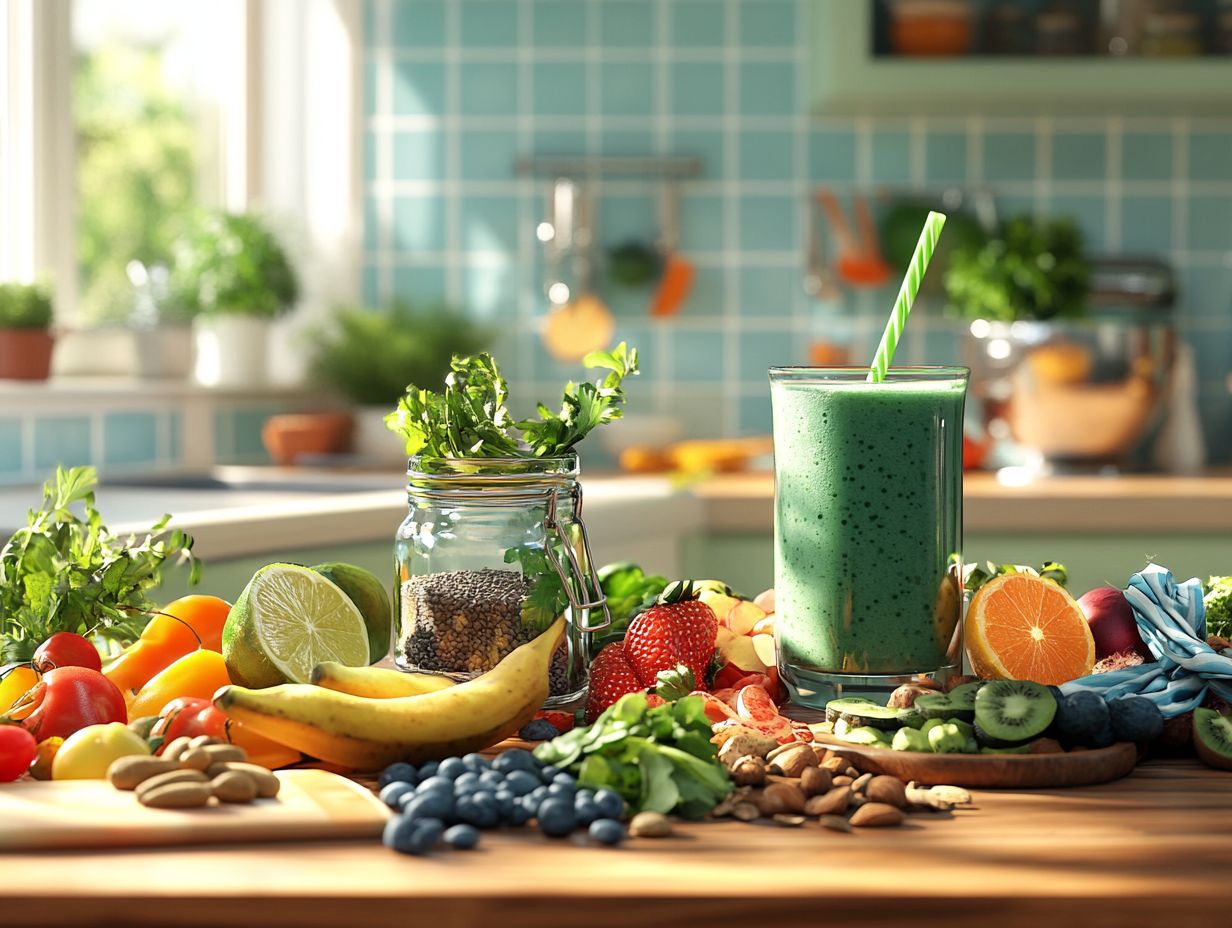 Vegetables are a vital component of a raw vegan diet, offering a wide variety of crunchy options that are rich in fiber and serve as important sources of micronutrients, promoting a healthy lifestyle. This diversity of vegetables enhances the raw vegan diet and provides numerous health benefits that contribute to vibrant living. Plus being crunchy ingredients that enhance the taste and appearance of salads, raw vegetables like kale, bell peppers, and cucumbers are powerful sources of antioxidants that help reduce oxidative stress and support overall health. Dark leafy greens are particularly beneficial, as they contain high levels of vitamin K, a nutrient known for enhancing the absorption of other nutrients in the body, especially calcium, which is crucial for bone health. Carrots and beets are versatile ingredients that can be enjoyed raw and shredded or grated, making them easy to incorporate into various dishes while preserving their natural enzymes. While raw vegetables are often eaten with dressing, marinating them in vinegar or citrus juice for a few hours before consumption can offer an exciting alternative without compromising their nutritional value.
Vegetables are a vital component of a raw vegan diet, offering a wide variety of crunchy options that are rich in fiber and serve as important sources of micronutrients, promoting a healthy lifestyle. This diversity of vegetables enhances the raw vegan diet and provides numerous health benefits that contribute to vibrant living. Plus being crunchy ingredients that enhance the taste and appearance of salads, raw vegetables like kale, bell peppers, and cucumbers are powerful sources of antioxidants that help reduce oxidative stress and support overall health. Dark leafy greens are particularly beneficial, as they contain high levels of vitamin K, a nutrient known for enhancing the absorption of other nutrients in the body, especially calcium, which is crucial for bone health. Carrots and beets are versatile ingredients that can be enjoyed raw and shredded or grated, making them easy to incorporate into various dishes while preserving their natural enzymes. While raw vegetables are often eaten with dressing, marinating them in vinegar or citrus juice for a few hours before consumption can offer an exciting alternative without compromising their nutritional value.
3. Nuts and Seeds
Nuts and seeds are among the most important protein sources in a raw vegan diet. They serve as excellent sources of protein and are a primary source of healthy fats essential for overall well-being. Additionally, nuts and seeds provide vital vitamins, minerals, and antioxidants that our bodies need to function properly. This makes it crucial for individuals following a plant-based lifestyle switch-up to incorporate nuts and seeds into their regular diet. Including nuts and seeds in meals and snacks offers energy, satisfaction, and essential nutrients. Their flavor and crunch add delightful texture and taste to various dishes. Packed with vital energy-providing nutrients such as B vitamins, magnesium, and iron, they help combat fatigue and strengthen the immune system. Moreover, the healthy fats found in nuts and seeds facilitate the nutrient absorption of other nutrients, enhancing the overall nutritional value of the diet and supporting the digestive system. A handful of walnuts, flaxseeds, chia seeds, or pumpkin seeds provides a significant dose of omega-3 fatty acids and fiber, both of which support the proper functioning of the digestive system. Therefore, nuts and seeds are essential components of a balanced, nutrient-rich diet.
4. Sprouts and Microgreens
Sprouts and microgreens are commonly featured in raw vegan recipes due to their exceptional nutrient density, which aids in the detoxification process and promotes age-related health benefits. These small ingredients are not only packed with flavor but also have the ability to enhance any dish. They improve the bioavailability of nutrients, making them easier for the body to absorb, and offer numerous health benefits. Incorporating sprouts and microgreens into raw vegan recipes allows for a wider variety of vitamins and minerals, which can boost the immune system and help maintain optimal energy levels. These versatile ingredients can be creatively used in a range of raw vegan dishes, from salads to smoothies to soups, adding a vibrant palette and culinary canvas to your meals. They not only enhance flavor and texture but also contribute to a raw food symphony that promotes the inclusion of nutrient-dense foods in daily diets. Their addition to any meal showcases the diverse ways to reap the health benefits of a plant-based diet.
What Foods Should You Avoid on a Raw Vegan Diet?
On a raw vegan diet, it is essential to avoid any foods that are not raw or plant-based. This includes all animal products, processed foods, and refined sugars. Steering clear of these foods helps maintain the integrity of the diet and supports its overarching goal of achieving optimal health and promoting sustainable living.
1. Meat and Animal Products
In a raw vegan diet, all forms of meat and animal products are strictly avoided due to the ethical considerations that underpin this lifestyle. By refraining from these foods, raw vegans can align their health pursuits with compassionate living, supporting the core principles of veganism. Choosing a raw vegan diet is not merely a matter of personal health; it reflects a profound respect for all living beings. Adherents of this diet abstain from consuming any meat, poultry, or fish under any circumstances. Additionally, eggs, dairy, and honey are also considered forms of animal exploitation and are therefore avoided. Many individuals who adopt this dietary lifestyle report improvements in health markers associated with the increased consumption of whole, unprocessed, and unrefined fruits, vegetables, nuts, and seeds. These foods are believed to promote optimal health, enhance energy levels, and protect against chronic diseases. Moreover, a growing body of research has begun to highlight the environmental destruction caused by animal agriculture. These studies indicate that reducing consumption from these industries can lower carbon footprints, decrease water usage, and preserve wildlife habitats, contributing to sustainable living and a wellness journey. Consequently, raw veganism serves as a pathway to promote a sustainable future while simultaneously supporting individual well-being through the consumption of whole, fresh, and nutrient-dense foods that foster optimal health.
2. Processed Foods
Processed foods can be highly detrimental to a raw vegan diet, as they contain additives, preservatives, and unhealthy fats that undermine the benefits of whole foods. By avoiding these items, individuals can ensure optimal nutrient absorption while adhering to the goal of consuming only natural and unrefined ingredients, embracing change and a healthy lifestyle. These processed substances can lead to inflammation, digestive disturbances, and decreased energy levels. For those committed to a healthy lifestyle, whole foods are essential because they are rich in nutrients crucial for proper bodily functioning. Fresh fruits, vegetables, nuts, and seeds supply the vitamins and minerals necessary for better health outcomes. Including processed foods in the diet can hinder the body s ability to absorb these critical nutrients efficiently, contradicting the principles of raw veganism. This not only affects physical health but can also result in a general decline in energy and overall well-being.
3. Refined Sugar and Salt
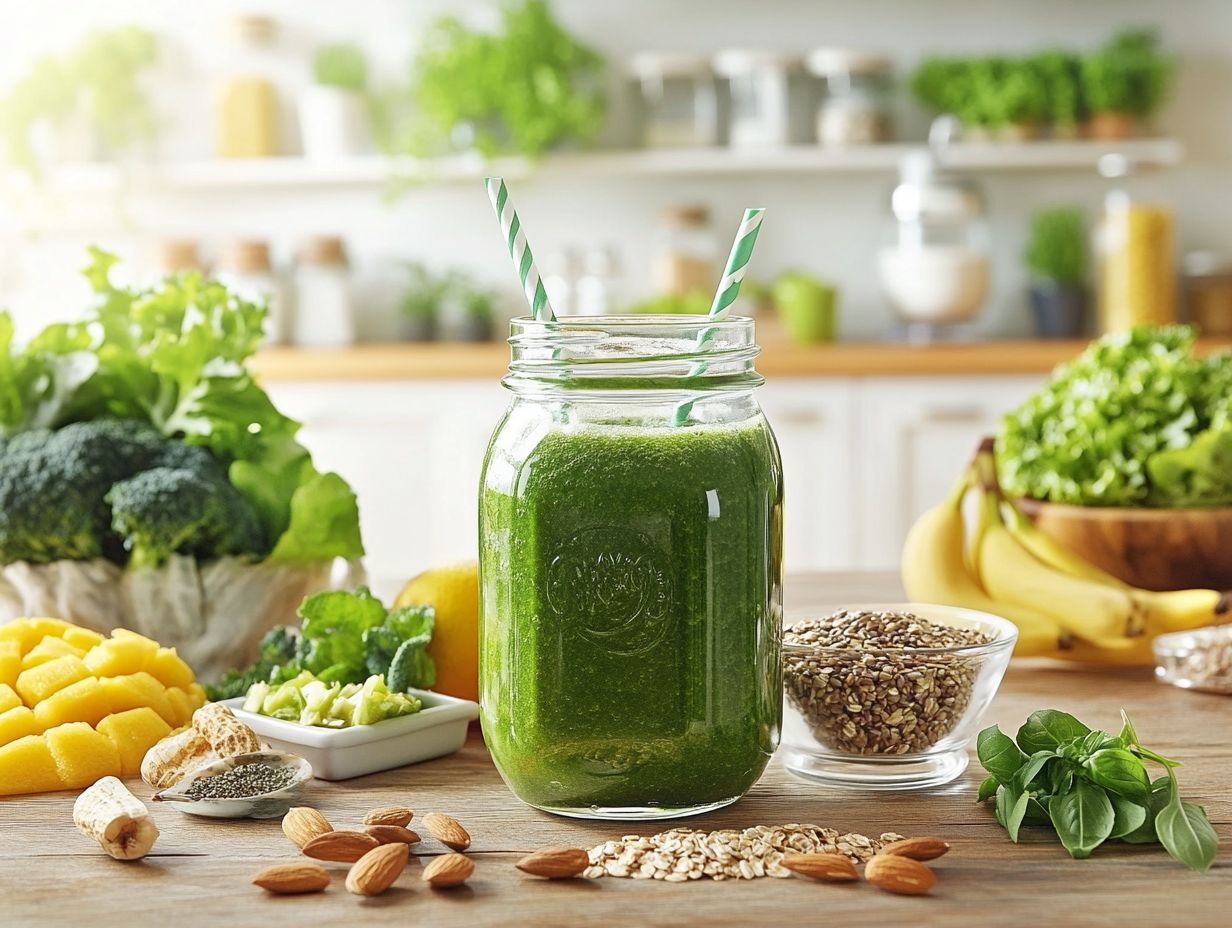 In a raw vegan diet, it is important to avoid refined sugar and salt, as these processed foods can lead to health issues and diminish the benefits of a nutrient-rich diet. Instead, individuals should embrace the natural sweetness of fruits and the flavors of whole foods to enhance their meals, promoting a nutrient-rich lifestyle and vibrant living. By steering clear of these additives, individuals can maintain their overall health and wellness while reaping the nutritional benefits of whole, unprocessed foods. Refined products typically contain high levels of sugar, which can disrupt metabolism and lead to weight gain and increased cravings. Additionally, excessive salt intake can contribute to hypertension and water retention. Enjoying the vibrant flavors of raw meals promotes satiety and supports a balanced diet that fosters energy, an energy booster, and vitality, aiding the process of aging gracefully. This approach allows the body to thrive by utilizing the natural sugars and nutrients found in fruits, vegetables, nuts, and seeds.
In a raw vegan diet, it is important to avoid refined sugar and salt, as these processed foods can lead to health issues and diminish the benefits of a nutrient-rich diet. Instead, individuals should embrace the natural sweetness of fruits and the flavors of whole foods to enhance their meals, promoting a nutrient-rich lifestyle and vibrant living. By steering clear of these additives, individuals can maintain their overall health and wellness while reaping the nutritional benefits of whole, unprocessed foods. Refined products typically contain high levels of sugar, which can disrupt metabolism and lead to weight gain and increased cravings. Additionally, excessive salt intake can contribute to hypertension and water retention. Enjoying the vibrant flavors of raw meals promotes satiety and supports a balanced diet that fosters energy, an energy booster, and vitality, aiding the process of aging gracefully. This approach allows the body to thrive by utilizing the natural sugars and nutrients found in fruits, vegetables, nuts, and seeds.
4. Oils and Fats
The raw vegan diet, a plant-based way of eating, encourages the consumption of healthy fats and nutrient-rich foods; however, it is important to avoid certain oils and fats that are highly processed, as they contradict the diet’s emphasis on whole foods and a nutrient-rich lifestyle. Healthy fat sources, such as avocados, nuts, and seeds, are key components of a plant-based diet and provide essential nutrients necessary for vibrant health and a healthy life. These fats, along with other plant-based foods, are rich in omega-3 and omega-6 fatty acids, which are critical for maintaining balanced hormone levels and supporting healthy brain function. In contrast, trans fats and excess saturated fats, commonly found in processed snacks and fried foods, can lead to inflammation and hinder nutrient absorption. This can negatively impact the digestive system, ultimately contributing to poor overall health and preventing vibrant living. By prioritizing natural, nutrient-dense sources of fat, individuals can enhance their body’s ability to absorb fat-soluble vitamins and antioxidants, thereby reaping the long-term health benefits and promoting vibrant living associated with a balanced raw vegan diet.
What Are Some Tips for Maintaining a Healthy Raw Vegan Diet?
Successfully following a raw vegan diet is achievable with careful meal planning and a nutrient-rich lifestyle. Tips for excelling on a raw vegan diet include:
- Effective meal planning using raw recipes
- Tuning into your body’s needs as part of your wellness journey
- Preparing for social situations and gatherings that may involve convenience foods
1. Listen to Your Body
Listening to your body is a fundamental wellness tip for anyone on a raw vegan diet, as it helps you identify your unique nutritional needs and make adjustments to your food choices accordingly. This practice fosters a deep connection with your health journey and encourages a mindful approach to healthy living. By tuning into bodily sensations like hunger and cravings, individuals can better align their dietary decisions with what truly nourishes them. This awareness not only enhances overall well-being but also acts as an energy booster throughout the day. Recognizing these signals enables individuals to choose foods that provide lasting sustenance rather than temporary gratification. For example, a craving for fresh fruits may indicate a need for hydration and natural sweetness, while a desire for leafy greens might suggest a craving for essential nutrients and fiber intake. Embracing these indicators allows for a more intuitive and enjoyable relationship with food.
2. Stay Hydrated
Hydration is crucial for raw vegans as it supports the digestive system and enhances the absorption of nutrients, such as antioxidants and enzymes, from the foods they consume. Drinking water and incorporating hydrating raw fruits and crunchy veggies can significantly enhance the health benefits of a raw vegan diet. Here are some suggestions to improve hydration:
- Drink a glass of water in the morning: This practice helps rehydrate the body after sleep and kick-starts the metabolism. Additionally, consuming water on an empty stomach can aid in flushing out toxins.
- Add hydrating foods: Including raw foods with high water content, such as cucumbers, watermelon, and oranges, can enhance flavor, texture, and hydration in a raw vegan diet.
- Snack on raw vegetables: This is an easy way to increase water intake. Setting hourly reminders to drink a glass of water can also effectively boost hydration.
- Opt for electrolyte-infused water: Electrolytes are essential for maintaining the body’s fluid balance, which is important for digestion. Incorporating electrolyte-rich foods like celery and coconut water can further improve digestive health and overall wellness.
3. Incorporate Variety into Your Meals
Eating a varied diet is essential for enhancing the palatability of a raw vegan diet while ensuring a wide range of nutritionally valuable foods is consumed. Incorporating a colorful variety of colors and ingredients not only improves the flavor of meals but also provides numerous nutrients and supports aging gracefully. Exploring vibrant combinations of fresh fruits, vegetables, nuts, and seeds can transform even the simplest raw meals into exciting and creative culinary masterpieces. For example, a dish of chopped mango with almonds and lime juice or a smoothie made with spinach, strawberries, and chia seeds are both enjoyable and nutritious raw recipes that showcase a vibrant palette and an array of colors. These colorful dishes not only taste great but also significantly contribute to overall health by delivering a spectrum of vitamins, minerals, and antioxidants that support immunity and vitality.
4. Don’t Be Too Hard on Yourself
Practicing self-compassion is essential when following a raw vegan diet. It allows individuals to embrace change without succumbing to perfectionism and helps them understand that lifestyle changes are a part of the wellness journey and take time. This approach fosters a healthier relationship with food choices and can contribute to long-term success. Occasional mistakes are a common part of any wellness journey, and recognizing this can enable individuals to be more forgiving of their choices. It is important to remember that adopting a raw vegan lifestyle is not about adhering to strict guidelines, but rather about exploration and discovery. Each step taken, regardless of the outcome, contributes to the process of self-discovery and achieving a nutrient-rich state. Granting oneself permission to experience the ups and downs of this journey can enhance motivation and ensure that the goal of achieving better health and vibrant living is both attainable and enjoyable.
